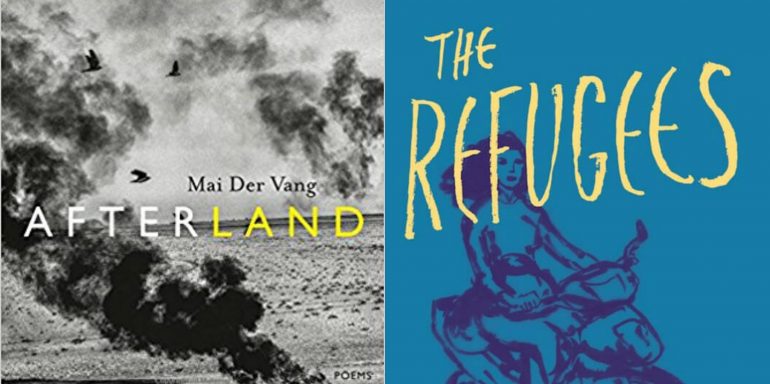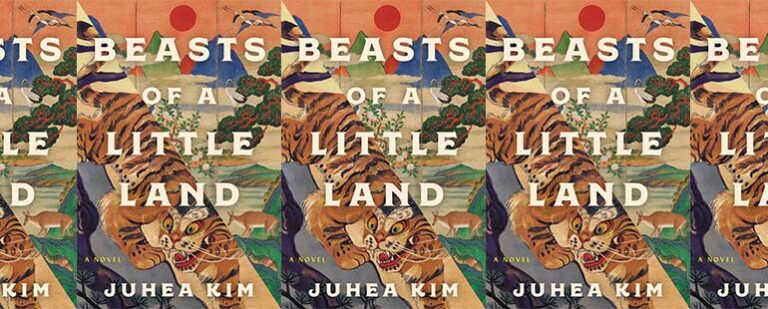The Refugee Narrative as Ghost Story

“When we migrate we murder from our lives those we leave behind,” wrote Mohsin Hamid in his heralded novel of the contemporary refugee crisis, Exit West. Migration, especially for refugees, is a violent crossing. When staying at home means dying and leaving means killing off the self you once knew, there is no way to stave off a haunting. And in Viet Thanh Nguyen’s story collection The Refugees and Mai Der Vang’s Afterland, the dead, and all else the living abandoned, refuse to be left behind.
Nguyen’s collection is dedicated to “all refugees, everywhere.” The stories match the sweep of the dedication, Vietnamese refugees figure in almost every story, but they aren’t Nguyen’s sole subject. Nguyen’s characters can’t, or won’t, give up the ghost. An American veteran returns to Vietnam to visit his daughter, whose hardheaded idealism flares up against his memories of the war. A girl and her mother fight off the hawkish demands of a neighbor who won’t abandon the dream of a free Vietnam. The collection’s first story, “Black-Eyed Women,” takes this haunting literally. Its unnamed narrator is a ghost writer, in the non-supernatural sense, living reclusively in Southern California with her aging mother, who likes to tell ghost stories of her own—tales from the life they left behind in Vietnam (“a haunted country”), before they fled the war with the narrator’s now-dead brother and father. She is working on the memoir of a man named Victor Devoto, who lost his family in a widely publicized plane crash, when her brother—still a child and wearing the same sweatshirt and shorts as when he died—knocks at her door. His presence unnerves her at first, but only because she knows what he wants, which is what all ghosts want: to make sure we don’t forget.
Never one to hold back on dramatic irony, Nguyen delivers fully in “Black-Eyed Women.” Despite her later (tongue-in-cheek) occupation as a ghost writer, the narrator was afraid of ghost stories as a child, the scariest of which were the very real horrors of war and colonialism that her father shared with her. She is a medium for the dead, but her own life is in stasis: single, solitary, her mother even tells her she is afraid to die because she “won’t even go outside to shop for groceries.” Her memories of her childhood in Vietnam are more vivid than anything in her life now. She and her brother would play by their house, running “through jackfruit and mango groves to the dikes and fields, dodging shattered palm trees and bomb craters.” She recalls them huddled together in a bunker as American jets fly overhead. Don’t worry, he reassured her: “They were only Phantoms.” “The dead move on,” Victor Devoto tells her. “But the living, we just stay here.” That life is the bitterest pill is something most come to know. That it takes the dead to reckon with the living is an ironic truth almost as difficult to swallow.
Ghosts are the refusal of the dead to stay silent. The narrator in “Black-Eyed Women” finally confronts the trauma and violence that has shadowed her life until now. “Why did I live and you die?” she asks her brother. “‘You died too,’ he said. ‘You just didn’t know it.’” It is the last time they speak. He leaves, but she stays, made anew by the knowledge that writing ghost stories is a way of writing about herself.
Vang’s Afterland is part elegy to the dead and part testimony of the living Hmong people during and after the Secret War in Laos. For Vang, who comes from a Hmong shaman tradition that believes in an afterland where the ancestors reside, the body is a vessel for spirits. There is no crossing, or living, without them. “Spirit, when I flee this jungle, you must too,” she writes in “Transmigration.” And the crossing itself is inflected by their haunting. From “Water Grave”: “We drift near banks, / creatures of the Mekong, / heads bobbing like // ghosts without bodies . . . ” It is, in fact, the living that are terrifying. Vang describes their crimes in fervent language, creating violent images that echo throughout the rest of the book. Addressing a Laotian soldier tortured by American soldiers with his brother, she writes, “It was scalpel that day they captured / you both. They sliced off / and boiled his tongue, // forced it down your throat.” In a later poem, “Thrasher,” Vang writes, “I hide my tongue within // The unleafed wooden scales / Of a tattered eucalyptus.”
The afterlife is an apt metaphor for the state of refugees: caught between two worlds, in the liminal space between life and death. In one poem, Vang offers up the afterlife as the “end of a book.” If there’s a lesson to be learned from war it’s that language has its limits: “When the words burn, all that’s left is ash.” But as with ghosts, their very trace, so often scattered to the wind, offer up new stories to tell.


